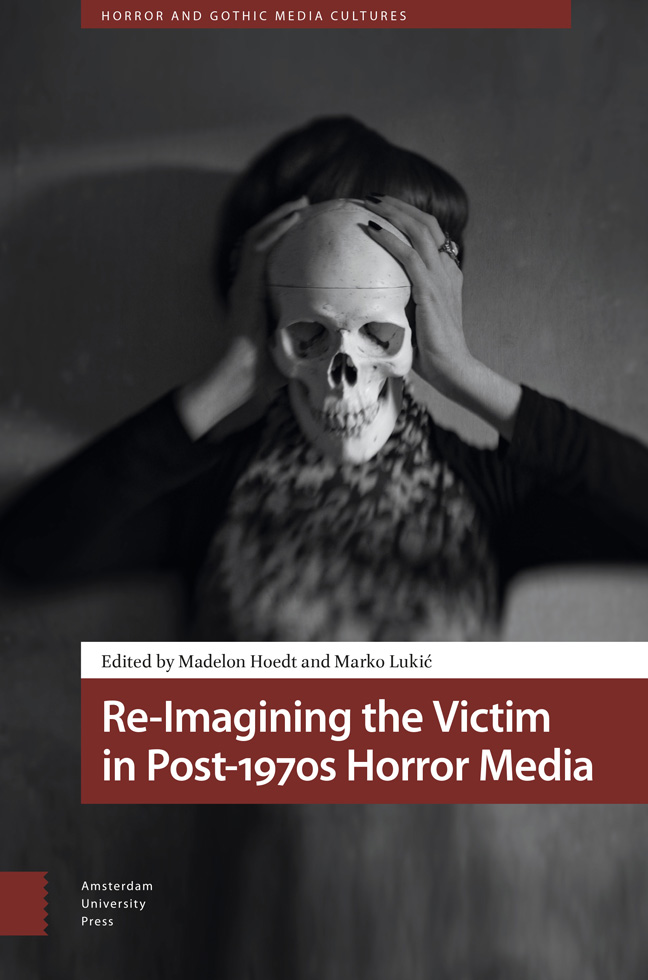Book contents
- Frontmatter
- Contents
- Introduction: Theorising the Victim
- 1 Opening the Gate: Reconfiguring the Child Victim in Stranger Things
- 2 Black Death: Black Victims in 1980s Teen Slashers
- 3 Beyond Binaries: The Position of the Transgender Victim in Horror Narratives
- 4 Through the Looking-Glass: The Gothic Victim in Jordan Peele’s Us
- 5 Postmortem Victimhood: Necrovalue in Phantasm and Dead and Buried
- 6 The Sad Killer: Perpetuating Spaces, Trauma and Violencewithin the Slasher Genre
- 7 “If this is the last thing you see… that means I died”: A Taxonomy of Camera-Operating Victims in Found Footage Horror Films
- 8 Victimhood and Rhetorical Dialectics within Clive Barker’s Faustian Fiction
- 9 Pain Index, Plain Suffering and Blood Measure: A Victimology of Driving Safety Films, 1955–1975
- 10 Biolithic Horror: Stone Victim/Victimisers in Resident Evil Village
- 11 The Potential Victim: Horror Role-Playing Games and the Cruelty of Things
- Bibliography
- Filmography
- Index
4 - Through the Looking-Glass: The Gothic Victim in Jordan Peele’s Us
Published online by Cambridge University Press: 26 March 2024
- Frontmatter
- Contents
- Introduction: Theorising the Victim
- 1 Opening the Gate: Reconfiguring the Child Victim in Stranger Things
- 2 Black Death: Black Victims in 1980s Teen Slashers
- 3 Beyond Binaries: The Position of the Transgender Victim in Horror Narratives
- 4 Through the Looking-Glass: The Gothic Victim in Jordan Peele’s Us
- 5 Postmortem Victimhood: Necrovalue in Phantasm and Dead and Buried
- 6 The Sad Killer: Perpetuating Spaces, Trauma and Violencewithin the Slasher Genre
- 7 “If this is the last thing you see… that means I died”: A Taxonomy of Camera-Operating Victims in Found Footage Horror Films
- 8 Victimhood and Rhetorical Dialectics within Clive Barker’s Faustian Fiction
- 9 Pain Index, Plain Suffering and Blood Measure: A Victimology of Driving Safety Films, 1955–1975
- 10 Biolithic Horror: Stone Victim/Victimisers in Resident Evil Village
- 11 The Potential Victim: Horror Role-Playing Games and the Cruelty of Things
- Bibliography
- Filmography
- Index
Summary
Abstract
Jordan Peele’s Us (2019) resorts to the Gothic figure of the doppelgänger in its representation of the hybrid, ambiguous victim, blurring the (moral) lines between the two protagonists, Adelaide and her clone Red. Peele also inscribes a political meaning to the character of the victim by exploring the issues of systemic oppression and exploitation, only to show that the idea of an ideal victim may be an obsolete concept in a world where everyone is victimised by the socio-economic system—that is, capital itself. The horror and paradox arise from the realisation that everyone is complicit in creating such an oppressive society, which both unsettles the notion of a victim and makes it central to our human existence.
Keywords: oppression, victimhood, race, doppelgänger, clone, capital
Contemporary horror film can hardly be discussed without considering the work of Jordan Peele, “Hollywood’s most inventive horror voice” (McCann). His debut Get Out (2017) offers a scathing criticism of the evil of racism and racial exploitation, reminding audiences that America is far from “living a blissful state of post-racial harmony” (McCann). In his second horror feature, Us (2019), Peele casts a wider net by exploring further, equally haunting social issues such as capitalist exploitation, poverty and the ever-present trauma of disenfranchisement. While the film may certainly be explored by focusing solely on the issue of race (from the perspective of critical race theory, for instance, which can be a topic of a separate research), the theme of racism is somewhat less prominent here than in Peele’s earlier film, and, due to its focus on dual identities, Us seems to be more intricate and more widely devastating, like capitalism itself. Notably, the only White characters in Us, the Tyler family, are killed by their own White clones (who in turn are killed by Black clones). Peele thereby avoids blatant racist inferences, which would allow for a clear identification of the victim (Black) and the oppressor (White), as was the case in Get Out. In this way, Us rejects clear demarcations of responsibility along the racial lines and looks for them along class lines, where they become more elusive. As this chapter argues, Us reveals that in a capitalist society everyone is simultaneously victim and oppressor, which keeps “us” enmeshed in a web of conflicting identities.
- Type
- Chapter
- Information
- Re-Imagining the Victim in Post-1970s Horror Media , pp. 79 - 94Publisher: Amsterdam University PressPrint publication year: 2024

